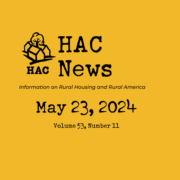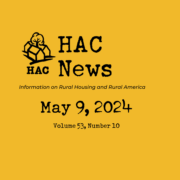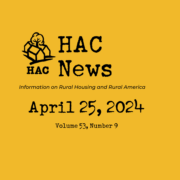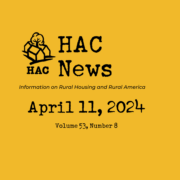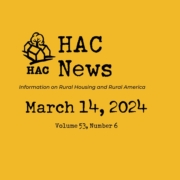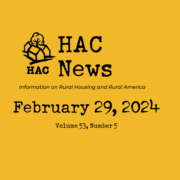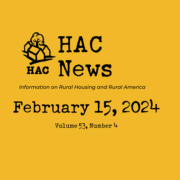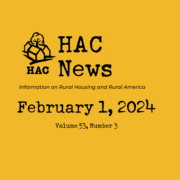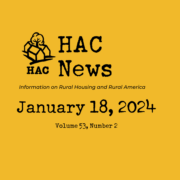HAC News: May 23, 2024
TOP STORIES
House to begin work on farm bill
The House farm bill, titled the Farm, Food, and National Security Act of 2024, has been introduced as H.R. 8467. Like the Senate’s version, the House bill directs USDA Rural Development to provide technical assistance to build local capacity in underserved and distressed areas. It does not, however, include any funding for such work. The House Agriculture Committee is expected to mark up the bill on May 23, with discussion likely to focus on contentious issues such as changes to the Supplemental Nutrition Assistance Program. In the Senate, full bill text has not yet been released and a markup has not been scheduled.
Preliminary FY25 funding totals and markup schedule announced for House appropriations bills
House Appropriations Committee Chairman Tom Cole (R-OK) released interim figures, known as 302(b) allocations, that set a total funding level for each FY25 appropriations bill. Defense spending would increase, while non-defense programs would be cut by 6%, with some departments receiving higher cuts and some lower. These preliminary caps may change. For specific programs, the House’s proposed funding levels will be set as each appropriations bill is drafted and reviewed. Cole’s markup schedule, which is also subject to change, calls for subcommittees to consider the USDA funding bill on June 11 and the Transportation-HUD bill on June 27, with the full committee reviewing both on July 10. The Senate Appropriations Committee has not yet announced 302(b)s or a schedule.
Consumer Financial Protection Bureau funding upheld by Supreme Court
On May 16 the Supreme Court, by a 7-2 majority, upheld the constitutionality of the CFPB’s funding mechanism, overturning a federal appellate court ruling and confirming the agency’s legitimacy. The 2010 Dodd-Frank Act created the CFPB with a funding mechanism outside the appropriations process in order to insulate the agency from political pressures. The payday lenders who brought the suit argued this was unconstitutional, but the Supreme Court held it was not. After the ruling, CFPB Director Rohit Chopra stated that enforcement actions put on hold while the case was pending will now move forward, along with agency efforts to address junk fees, credit reports, and more.
Is your organization prepared for summer disasters?
There is no off season for disasters, but the June 1 beginning of hurricane season – predicted to be above normal this year – makes this a good time for many to think about disaster readiness. HAC’s Rural Resilience website offers tools for readiness, response, and recovery, including HAC’s detailed guide, Prepare Your Organization to Respond and Recover from Natural and Man-Made Disasters.
RuralSTAT
Between 2020 and 2023, home prices rose by at least 40% in nearly one-third of counties outside of metropolitan areas. The average home-value-to-income ratio increased from 2.5 in March 2017 to 3.9 in March 2023. Source: Joint Center for Housing Studies, The Geography of Pandemic-Era Home Price Trends and the Implications for Affordability.
OPPORTUNITIES
PRICE manufactured housing notice revised, deadline extended
HUD published a modified funding announcement on May 20 for the new Preservation and Reinvestment Initiative for Community Enhancement (PRICE) manufactured housing program. Applications are now due on July 10. For more information, email PRICE@hud.gov.
Indian CDBG funds available
HUD is accepting applications from Tribes and Tribal organizations for the competitive Community Development Block Grant Program for Indian Tribes and Alaska Native Villages. The deadline is July 15. For more information, email ONAP-ICDBG@hud.gov.
ReConnect broadband application deadline extended
Due to technology performance issues, USDA has extended the deadline to apply for the ReConnect Program. Applications are now due May 28 rather than May 21. For more information, use the online contact form at https://www.usda.gov/reconnect/contact-us.
USDA offers summer meals for kids
The Summer Nutrition Programs for Kids offered by USDA’s Food and Nutrition Service can provide traditional congregate summer meals, meals “to go” for pick-up or home delivery, and SUN Bucks for groceries. Information for providers and participants is available online, along with a map to find state government contacts where FNS does not have information.
Rural Innovator nominations open
Through a new Rural Innovators Initiative, the White House will recognize innovators who are making a positive impact in their rural communities. Nominated individuals can be of any age and engaged in the public or private sector. The nomination form will close on June 14.
REGULATIONS AND FEDERAL AGENCIES
HOME program proposed rule released
HUD has posted a pre-publication version of proposed “modernized” regulations for the HOME Investment Partnerships Program. HUD says the rule includes provisions to expand access to community housing development organization (CHDO) set-aside funds by neighborhood-based nonprofits; clarify homeownership requirements; better align HOME rental housing with other federal programs; simplify requirements for small rental housing projects; make HOME tenant-based rental assistance work better for vulnerable populations; strengthen tenant rights and protections; establish a new method for determining maximum per-unit subsidy limits; and provide incentives to incorporate green building technologies. Comments will be due 60 days after the proposal is published in the Federal Register.
HUD considers extending Buy America waiver for Tribes
HUD’s waiver of the Build America, Buy America Act domestic content preference for Tribes, Tribally Designated Housing Entities, and other Tribal entities was scheduled to expire on May 22, but the department proposes to extend it to September 30. Comments on the extension are due June 17. For more information, email BuildAmericaBuyAmerica@hud.gov.
Comments sought on Federal Home Loan Bank System mission
The Federal Housing Finance Agency requests input on updating the Federal Home Loan Bank System’s mission statement to reflect the System’s role in housing finance, developing metrics and thresholds to evaluate mission achievement, and identifying incentives for FHLBank members. Comments are due July 15 through FHFA’s website (select “FHLBank Mission” from the menu) or by mail.
EVENTS
Webinar to address rural housing and health
Understanding Housing as a Social Driver of Health for Rural Residents will be presented on May 29 by the Rural Health Research Gateway at the University of North Dakota. Presenters will cover findings on rural/urban differences in housing cost burden and quality, as well as challenges and opportunities to improve housing as a social driver of health through policy and programming.
PUBLICATIONS AND MEDIA
Home prices increased more in rural areas during the pandemic
A new working paper from Harvard’s Joint Center for Housing Studies, The Geography of Pandemic-Era Home Price Trends and the Implications for Affordability, highlights that while home prices rose across the country from 2020 to 2023, home price growth was disproportionately higher – averaging 36% – in counties outside metro areas, counties in smaller markets, and the lower-density suburbs of large metro areas with over 1 million people, compared to 21% growth in the higher-density urban counties of large metro areas.
Fact sheets connect housing to other sectors
The National Low-Income Housing Coalition’s Opportunity Starts at Home Campaign has posted 16 multi-sector fact sheets compiling evidence that demonstrates the links between safe, affordable housing and health, education, racial equity, and a host of other concerns.
Podcast series covers rural housing and homelessness
The Rural Impact podcast, which describes itself as “a podcast that connects the dots between policy and rural everything,” is airing a series of episodes on rural housing and homelessness. Four of these episodes have been released so far. HAC’s director of public policy, Jonathan Harwitz, was a guest on the first. The podcast is also available on YouTube.
Timeline examines how U.S. housing policy fostered inequities
A History of Housing Policy Through a Racial Equity Lens is an interactive timeline developed by Enterprise Community Partners. It describes how centuries of racist and exploitive housing and land policies fostered many of the socio-economic inequities currently borne by Black, Indigenous, and other people of color.
USDA blog features HAC’s Shonterria Charleston
HAC’s director of training and technical assistance, a member of the Rural Community Economic Development subcommittee of USDA’s Equity Commission, is profiled in a recent USDA blog post titled Shonterria Charleston: Serving Rural Communities Through Safe Housing.
CORRECTION
The May 9 HAC News provided an incorrect link to a USDA home repair program in its first story, titled “USDA warns of shortfalls in single-family programs.” HAC will post a corrected version of the story soon.
HAC is hiring
HAC job listings, each with application instructions, are available on our website.
- Loan Asset Management Intern
- Senior Loan Officer
- Portfolio Management Associate
- Research Associate
- Research Assistant
Need capital for your affordable housing project?
HAC’s loan fund provides low interest rate loans to support single- and multifamily affordable housing projects for low-income rural residents throughout the U.S. and territories. Capital is available for all types of affordable and mixed-income housing projects, including preservation, new development, farmworker, senior and veteran housing. HAC loan funds can be used for pre-development, site acquisition, site development, construction/rehabilitation and permanent financing. Contact HAC’s loan fund staff at hacloanfund@ruralhome.org, 202-842-8600.
Please note: HAC is not able to offer loans to individuals or families. Borrowers must be nonprofit or for-profit organizations or government entities (including Tribes).
Want to reprint a HAC News item?
Please credit the HAC News and provide a link to HAC’s website. Thank you!

